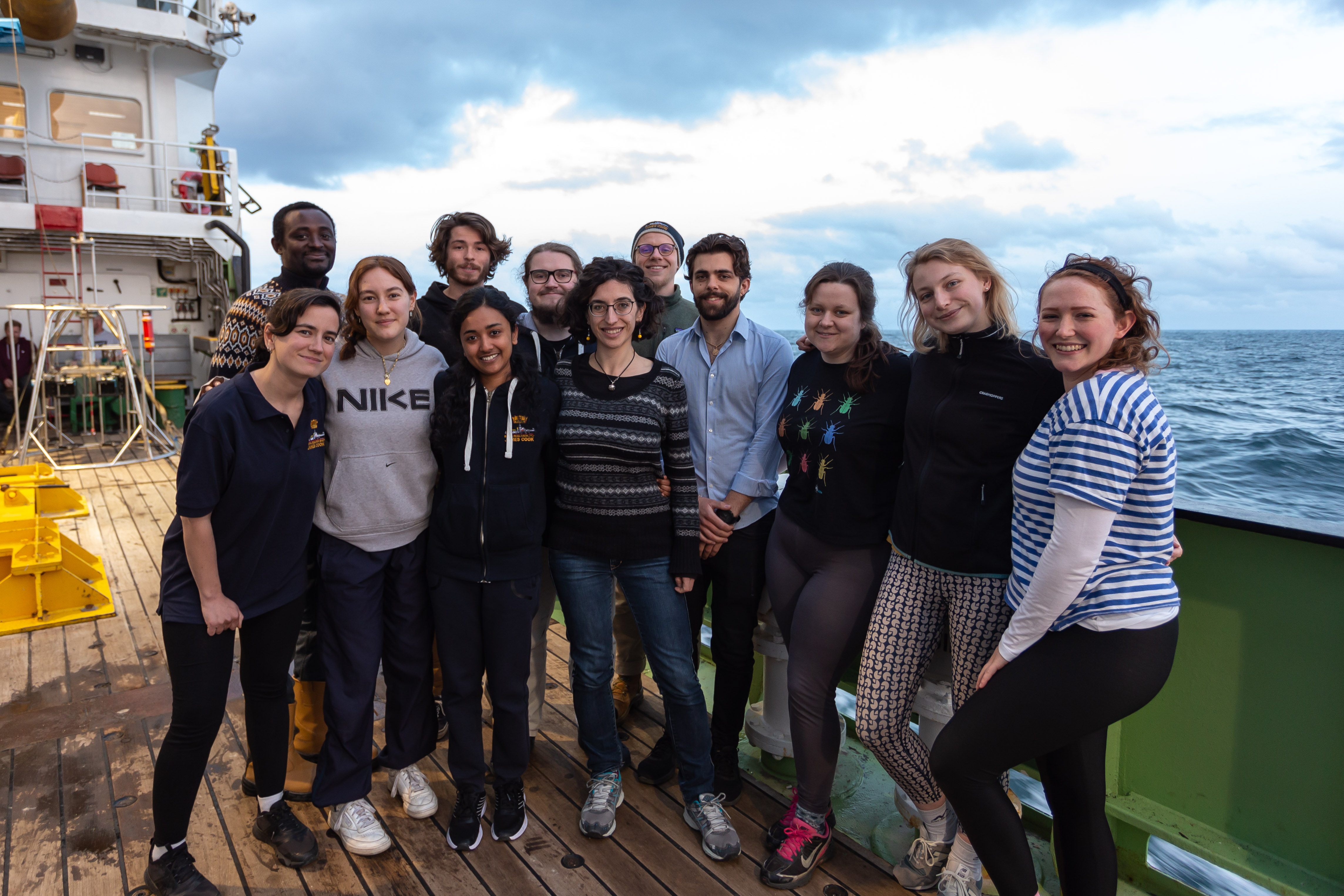Research Cruise JC247 sees a team of scientists and engineers returning on the RRS James Cook to the Porcupine Abyssal Plain Sustained Observatory (PAP-SO) site, one of the longest running multidisciplinary open ocean and abyssal observation stations in the world. Since our arrival on the 8th of May we’ve been building on the wide variety of long-term observation datasets, some of which stretch back to 1985.
This year we’ve been expanding the array of sensors monitoring the site, adding instruments for plankton identification and pH analysis onto the year-round mooring. Meanwhile, the benthic team have been testing new methods for capturing the ecology of the deep sea using novel sensors and with the first deployments of a newly designed amphipod trap.
Excitingly, JC247 has also hosted a large group of early career scientists and scientists experiencing their first research cruise! Pictured above, this team brings together a variety of new perspectives.

Lucy Goodwin, currently in the first year of her PhD at the University of Liverpool, studies abyssal food-webs and their response to a changing climate. Lucy is here as part of the CLASS programme, collecting samples of benthic megafauna for stable isotope analyses, and to understand the sediments they consume.
Emma Curtis is a 3rd year PhD student at the University of Southampton. Her project looks at how we can improve the reliability of the measurements we gather from seafloor images, and with the use of machine learning improve our ability to monitor benthic ecosystems in an efficient and non-invasive manner.
Izzy Cooper is a PhD student at the University of Southampton studying sediment biogeochemistry, focusing on the benthic fluxes of nutrients, trace metals, and pollutants. Her research bridges the gap between geochemical and ecological approaches, combining radioisotopic techniques with the quantification benthic faunal activity.
Hans Hilder is a research technician working for the NOC. His work centres on the analysis of data collected by autonomous underwater vehicles, such as gliders and ARGO-floats, and how we can use these measurements to improve our understanding of the ocean’s carbon cycle.
Sneha Sunny is a Masters student at the University of Southampton where she is working on a dissertation using sea cucumber specimens from PAP-SO in the Discovery Collections. JC247 is her first research cruise and gives her the opportunity to understand the context of her research project.
Elisa Lovecchio is an early career scientist employed at NOC as a biogeochemical modeller, focusing on the cycling of carbon and oxygen. JC247 is her first time collecting in-situ observations. As a member of the pelagic team, Elisa is creating near-real-time data visualizations that put the underway ship measurements into context.
Emmanuel Tope Oluwabusola is a senior research fellow at the Marine Biodiscovery Centre (MBC), University of Aberdeen. He is a marine natural product chemist interested in assessing the value of marine biodiversity for novel bioactive metabolites. JC247 is his first research cruise.
Jethro Reading is a research technician at the University of Southampton, employed on a NERC-funded research project, using stable isotope analysis to quantify the impact deep-sea fish have on the carbon cycle. His dissertation project involved working in the Discovery Collections, where he became familiar with the PAP-SO, helping to rehouse specimens collected during last year’s cruise.
Theo Picard is a 2nd year PhD student studying at Université De Bretagne Occidentale. Onboard as a part of the CLASS fellowship and French APERO programme, Theo is working on deep sediment trap data from PAP-SO to estimate carbon storage in the deep ocean.
Louise Gao is an MSc Oceanography student at the University of Southampton currently collecting zooplankton samples for the PAP-SO time series. Her aim is to use the data gathered as a part of her summer dissertation project, investigating the role meso-zooplankton play in the biological carbon pump at PAP-SO.
Georgina Valls Domedel is an early career scientist working at the NOC and specialising in taxonomy. Recently, she has started working on benthic and pelagic deep-sea isopods collected from the Clarion Clipperton Fracture Zone in the Pacific Ocean. At PAP-SO she identifies the isopod specimens collected, providing a unique understanding of the communities inhabiting the site.
Many thanks to all of you for your continued hard work and inspiring attitudes. Wishing you the best of luck in all your endeavours!
Hans Hilder